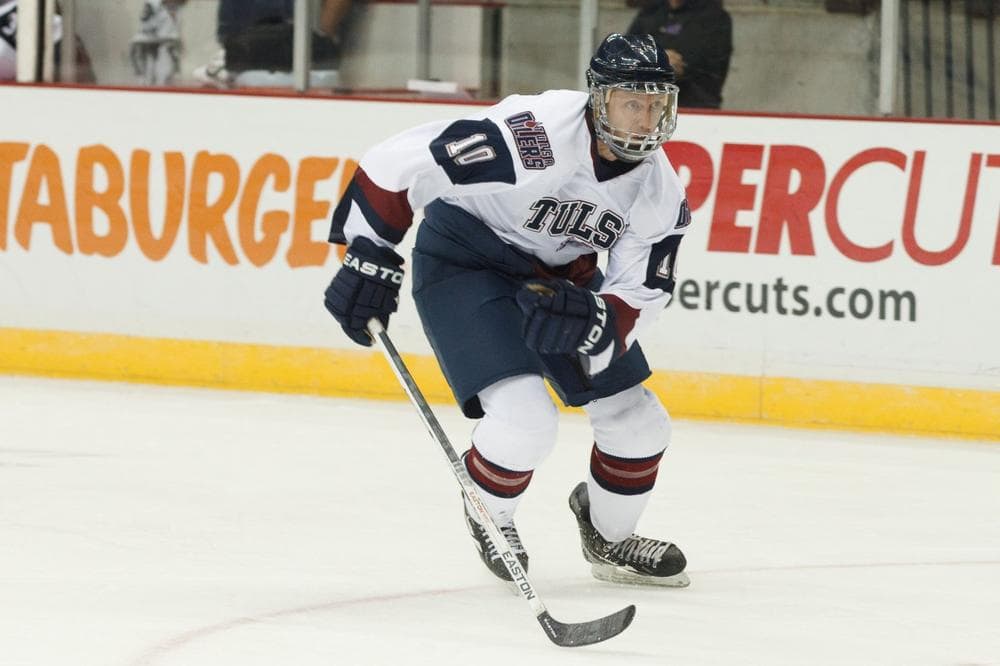Advertisement
Interview
David-Alexandre Beauregard: One Eye, 20 Years, 540 Goals
Resume
The 2013 Sports Illustrated Sportsman of the Year is Denver Broncos quarterback Peyton Manning. You may have heard of him. But SI also gave writers a chance to share their own choices. Executive Editor Jon Wertheim picked David-Alexandre Beauregard, a pro hockey player who labored 20 years in the minors and never reached the NHL. He wasn’t allowed to because he’s blind in one eye. Beauregard and Wertheim joined Bill Littlefield to explain the situation.
BL: Jon, tell me a little bit about why you nominated David.
JW: The Sportsman is, I think, intentionally murky as far as criteria – usually it goes to a fairly prominent athlete: Peyton Manning this year, LeBron James last year. But boy, you sort of look at the virtues that we like in sports – resiliency and durability and spirit and sportsmanship – and I couldn’t come up with a better candidate than David.
BL: David, you were drafted by the San Jose Sharks back in 1994. Tell us how you lost sight in your left eye during that first season in the minors.
I seriously probably was the worst player out there. I was hitting the boards. I couldn’t receive a pass.
David-Alexandre Beauregard on the early days of his comeback
BL: Did you think at that point that your hockey days were over?
DAB: Of course. I knew that I’d probably play hockey again, but with my friends or in some beer league somewhere in Canada. But, after the injury, no way I would’ve thought I’d play again in a contact sport.
BL: David, you returned to the ice. Can you describe how you were able to compensate for your left eye in a game that often requires eyes in the back of your head if you’re gonna, you know, really going to watch out for what’s coming.
DAB: Oh boy, that was a story. I went back on the ice I think three days after my injury, and I seriously probably was the worst player out there. I was hitting the boards. I couldn’t receive a pass. I had no idea how fast the puck was coming, so it took me a long adaptation. But after a good month and a half or two I was getting like way better, and in my head, I was like, “Do you know what? Maybe, maybe I should try to make a comeback just in junior and see what’s gonna happen.” So I finally tried to make a comeback, and I scored on my first game back, and I think it’s my biggest satisfaction that I tried to play hockey again.
BL: When you figured out that you could play at a high level, were you aware that the NHL has a rule prohibiting players who are blind in one eye?
DAB: Oh, I knew right away. And when I came back I was 18. I just wanted to finish my two years [in] juniors. I wasn’t saying, “Oh, I’m going to have a professional career.” I was just really enjoying playing hockey, and I said if I can finish my junior career it’s gonna be great. I had two years left. And after that I had a great last two years. I received some invitations to the minor leagues, and I went, and it went really well, and I really enjoyed every year that I played.
BL: Jon, I have to acknowledge that here at Only A Game, we couldn't come up with many parallels to David's story anywhere in the world of sports. Did his determination remind you of other athletes you've encountered or read about?
JW: I did a story several years ago on Adam Greenberg. Bill, I think you may have had him on the show.
BL: Yes, we did!
JW: So, you remember the story where literally his first big-league at-bat he was unfortunately hit on the head with a pitch and was concussed and never really made it back to the majors until several years ago when he was called up really, almost as an act of kindness, not as a real prospect.And I think that was about as close as I got.
And I think you hit on it: what makes this particularly poignant is that because of this policy, and I don't think anyone argues with the wisdom of it, David knew immediately that there was a ceiling, and I think that's something that's really unique. We've certainly seen other athletes with these injuries try to make comebacks, and it's always a bit bittersweet when they don't get there because they haven't reached their potential. Well, here the potential was already set, and so he was able to maximize that.
BL: Now David, you retired earlier this year at the age of 37, and your retirement from hockey follows the same storyline we’ve heard over and over again: you jumped from the ice into selling a wood-working tool ... wait a minute. How’d you make that switch?
DAB: My grandfather’s an inventor, and he always invented his own tools. It’s the first one right now that we put on sale. The demand is unbelievable in Canada, and right now, I’m on the road. You know, it’s far away from hockey. I miss every part of the hockey world, but every great thing comes to an end, and I accept that.
This segment aired on December 21, 2013.